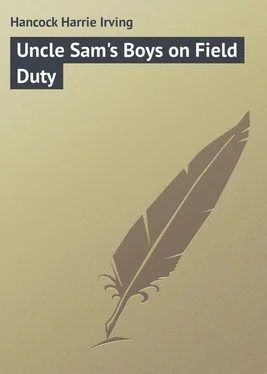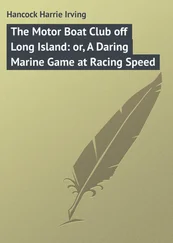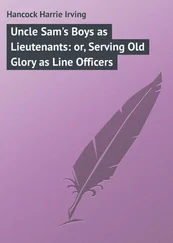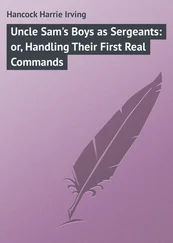Harrie Hancock - Uncle Sam's Boys on Field Duty
Здесь есть возможность читать онлайн «Harrie Hancock - Uncle Sam's Boys on Field Duty» — ознакомительный отрывок электронной книги совершенно бесплатно, а после прочтения отрывка купить полную версию. В некоторых случаях можно слушать аудио, скачать через торрент в формате fb2 и присутствует краткое содержание. ISBN: , Издательство: Иностранный паблик, Жанр: foreign_prose, на английском языке. Описание произведения, (предисловие) а так же отзывы посетителей доступны на портале библиотеки ЛибКат.
- Название:Uncle Sam's Boys on Field Duty
- Автор:
- Издательство:Иностранный паблик
- Жанр:
- Год:неизвестен
- ISBN:http://www.gutenberg.org/ebooks/52755
- Рейтинг книги:4 / 5. Голосов: 1
-
Избранное:Добавить в избранное
- Отзывы:
-
Ваша оценка:
- 80
- 1
- 2
- 3
- 4
- 5
Uncle Sam's Boys on Field Duty: краткое содержание, описание и аннотация
Предлагаем к чтению аннотацию, описание, краткое содержание или предисловие (зависит от того, что написал сам автор книги «Uncle Sam's Boys on Field Duty»). Если вы не нашли необходимую информацию о книге — напишите в комментариях, мы постараемся отыскать её.
Uncle Sam's Boys on Field Duty — читать онлайн ознакомительный отрывок
Ниже представлен текст книги, разбитый по страницам. Система сохранения места последней прочитанной страницы, позволяет с удобством читать онлайн бесплатно книгу «Uncle Sam's Boys on Field Duty», без необходимости каждый раз заново искать на чём Вы остановились. Поставьте закладку, и сможете в любой момент перейти на страницу, на которой закончили чтение.
Интервал:
Закладка:
From the group of officers ahead on the trail came Captain Freeman and First Lieutenant Ray of C Company.
"Mr. Holmes," called Captain Freeman, "let C Company fall in and take up the march again."
Young Lieutenant Holmes instantly gave the order to fall in. A moment later C Company moved off at the route step.
"What does that mean?" Hal asked Hyman.
"Oh, some new scheme that the officers have hatched up," replied Hyman. "There'll probably be a sham engagement on between C and our company to-morrow."
"We're lucky if it doesn't take place in the night," grunted another soldier.
"Well, my man, suppose it does?" demanded Sergeant Hupner, appearing behind the "kicker." "What do you suppose these manœuvres are for? They're to teach you the soldier's trade. They're to fit you so that, in actual war, you'll know what to do under any given conditions. The better you know your trade, in war, the better chances you have to come out of the war alive. This field duty, which so many of you dislike, is for the training of every officer and man in the very things he does in war time. The better every officer and man understands them the better is each fellow's chance of keeping alive in war time. Those of you who grumble ought to be ashamed of yourselves. Look around you at some of the older soldiers who've seen service, and you'll find they never kick."
"B Company fall in!" rang the order, this time from Captain Cortland.
But the march was to be a short one. The command was led into the grove and halted. The order to pitch camp was given. Now a lively scene followed.
As the outer covering of his blanket roll each soldier carries a flap of canvas, which constitutes one half of a shelter tent, as it is officially termed. The soldier's name for it is dog tent or pup house. Each man also carries two jointed sticks. One pair of sticks is jointed to form the front pole of the tent, the other the rear pole. In front of the tent site a peg is driven, and a cord passed from this peg up over the front pole, across to the rear pole, and down to a peg at the rear. Now the two flaps of canvas are fitted over this frame and the tent is up.
"Let's beat the company to it, Noll?" breathed Hal in his bunkie's ear. In the Army the "bunkie" is the man with whom the tent is shared. Usually two bunkies become close chums, even if they were not before joining the service.
"We've done it," breathed Hal, as he and Noll straightened up and gazed about them. "That takes the crimp out of a few veterans."
"Get a hike on, some of you men!" called First Sergeant Gray briskly. Then he turned to glare mildly at Hooper and Dowley, who were finishing last.
Corporal Cotter, his own tent up with Corporal Reynolds, turned to look down the company street.
"Hooper, you and Dowley are going to hear something," predicted the corporal dryly.
"That's done well enough," grumbled Dowley, glancing at his tent.
Captain Cortland stood at the head of the company street glancing down.
"One tent forward out of alignment," called the company commander, then stepped down the street. "Who are the men that occupy this tent?" he demanded, halting.
"My tent, sir," mumbled Hooper.
"And mine, sir," added Dowley.
"Don't you men know how to erect a tent in alignment with the street front?" inquired Captain Cortland. "Take it down. Corporal Cotter, stand by to see that these men set up their tent in soldierly fashion."
"I told you you'd hear something," remarked Cotter.
"Aw, what's the use of being so finicky about a tent a quarter of an inch out of alignment?" grumbled Hooper.
"The tent is more than that out of alignment," returned the corporal. "And there's every use in the world in performing every duty in the most soldierly fashion."
"Say," began Dowley argumentatively.
"Silence, and get on with your work," ordered Corporal Cotter sharply. "Hooper, you're close to thirty-five years old. Dowley, you're around thirty. Yet those two kids, Overton and Terry, are only eighteen, and they beat you at every point in soldierliness."
"Soldiering is a kid's game," growled Dowley.
"The best men we get in the Army are those we catch young," retorted Corporal Cotter. "Stop! Tighten that cord a whole lot more." "How does that suit you, Corp?" demanded Dowley when, at last, the sulky bunkies had again finished their task.
"Address me as Corporal, not Corp," returned Cotter stiffly.
"Well, Corporal, how do you like the set of our tent now?" insisted Private Dowley.
"It looks better this time," assented the corporal. "But, after this, you men, instead of sneering at the kids of the company, will do well to show yourselves as good men."
"We're always getting the kids rubbed into us," growled Hooper.
"Because they're head and shoulders over you both as soldiers," rejoined Corporal Cotter, turning on his heel. "Even William Green is a lot ahead of you as a soldier."
As Dowley turned to glance scowlingly up the street he caught the glance of Captain Cortland, glancing once more down the street.
"Your tent is in proper alignment this time, men," nodded the company commander, and went away.
Now the creaking of heavy wagons was heard along the trail, accompanied by the loud voices of the drivers. The expedition was accompanied by six heavy wagons, each drawn by four mules.
"Water in the brook; wood two hundred yards southeast!" shouted Lieutenant Prescott, who had been sent scouting for these necessities. On pitching camp the first task is always to learn where wood and the best drinking water can be found in the neighborhood. Often the water close at hand is forbidden for cooking and drinking purposes in favor of clear water at a distance.
Three of the approaching wagons continued along the trail, while the other three turned in at the side of the grove.
Corporal Reynolds and four men were detailed to unload and put up the eight-by-ten khaki-colored tent that was to be occupied by the three company officers.
"I notice that the wide stripes don't care about sleeping in pup-houses," grumbled Hooper to his bunkie.
"Wide-stripe" is the nick-name sometimes given an officer on account of the fact that the side stripe down the trousers' leg of the blue uniform is much broader than that worn by the non-commissioned officer. Privates wear no stripes on the trousers' leg, with the exception of musicians, who wear two very narrow parallel stripes.
Soon after the erection of the little village of tents, the soldiers scattered, though they soon returned with bundles of fire wood.
"You had better go and chase the stuff for our fire, Bill," proposed Dowley.
"Chase it yourself," retorted Hooper.
"Not this trip," retorted Dowley. "It's up to you this time."
Hooper swore that he wouldn't, but it ended by his starting tardily after fagots. Dowley was already gaining the ascendancy over Private Bill and making a half servant of him.
Presently some forty fires were blazing brightly in an irregular line at a distance of some yards from the line of dog-tents. American soldiers were preparing their evening meal in the field. The operation was an extremely simple one. First, each soldier dropped a handful of coffee beans into his agate drinking cup. With the butt of the bayonet he crushed these beans, the fineness depending upon his skill. Then from the canteen each man poured water enough nearly to fill the cup, which was then set on the fire for boiling.
By the time that the coffee had boiled for a few minutes each soldier returned his cup to the ground beside him. A dash of cold water from his canteen was sufficient to "settle" the coffee.
Now, each man placed two or three strips of bacon in his frying pan and laid it on the coals. While these morsels were sizzling the soldier turned his attention to sweetening his coffee. Then, when the bacon was cooked to his satisfaction, each man brought out his field hard tack, munching alternately on biscuit and meat.
Читать дальшеИнтервал:
Закладка:
Похожие книги на «Uncle Sam's Boys on Field Duty»
Представляем Вашему вниманию похожие книги на «Uncle Sam's Boys on Field Duty» списком для выбора. Мы отобрали схожую по названию и смыслу литературу в надежде предоставить читателям больше вариантов отыскать новые, интересные, ещё непрочитанные произведения.
Обсуждение, отзывы о книге «Uncle Sam's Boys on Field Duty» и просто собственные мнения читателей. Оставьте ваши комментарии, напишите, что Вы думаете о произведении, его смысле или главных героях. Укажите что конкретно понравилось, а что нет, и почему Вы так считаете.












